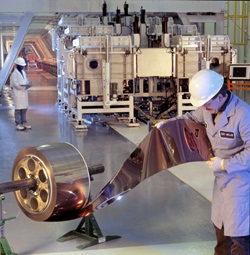Tijuana building large number of world's solar equipment
 Tijuana, Baja California, Mexico, has been developing solar panels for more than a decade, and the infamous border town likely will play a major role in developing components for more green power to meet demand in California and the world.
Tijuana, Baja California, Mexico, has been developing solar panels for more than a decade, and the infamous border town likely will play a major role in developing components for more green power to meet demand in California and the world.
Work being done in Tijuana was highlighted at two recent U.S. events, according to the Tijuana Economic Development Council.
Although best known for nefarious reasons in the U.S., Tijuana is home to significant manufacturing facilities, including those for two of the world’s larger photovoltaic (PV) manufacturers, Kyocera and UniSolar.
At the Solar Power 2010 conference in California, the Tijuana Economic Development Council highlighted the manufacturing facilities and their recent expansions.
According to a Nov. 10 press release by the council, Kyocera Mexicana “designs, engineers, and manufactures multi-crystal photovoltaic (PV) modules & assembly bases for ceramic semiconductors,” at their facility Tijuana.
Tijuana Economic Development Council Executive Director Flavio Olivieri said that Kyocera has been producing electronics in Tijuana for 15 years and manufacturing PV modules at their facility for three to four years.
And UniSolar has been manufacturing PV in Tijuana for 18 years, he said.
“This year they’re adding 200 more positions,” he said. That would bring their total number of employees in the area up to 800.
Together, Kyocera and UniSolar employ about 1,600 people in Tijuana. Other PV companies have expressed interest in building manufacturing facilities in the city, but thus far none have committed to it, according to Olivieri.
Also in October, former Vice President Al Gore spoke about sustainability and Baja California’s manufacturing prowess in the green energy fields, including solar.
“I am keenly aware of how important it is that Baja is a neighbor to California,” Gore said during his speech. “It’s been a leader in green energy and accountability. Combined they are a leader in sustainable energy.”
He also recognized that a number of wind and solar energy projects now are able to serve both Baja California residents and California residents through the existing grid in the region.
“Sustainable energy companies are already here, and benefitting from our lower-cost, yet highly innovative manufacturing culture,” said Oliveri in the press release. “That—and the fact that Tijuana’s total cost to the U.S. market is often lower than China—is why we continue to grow some of the largest solar companies in the world here.”
While no other manufacturing facilities for wind or solar have been built in Tijuana at this point, the idea is still on the table.
“We’ve had interest from several companies but haven’t signed anything,” Oliveri said.
Looking forward, future green energy manufacturing in the area could include more solar and wind.
He added that other manufacturing facilities, which now produce parts for ships, automobiles and jets could be repurposed to manufacture parts for wind turbines, among other things.
Pictured: A worker in UniSolar's Tijuana facility pulls a roll of thin film to make a series of golden tickets, which are sure to bring a veritable cornucopia of oddballs into the plant to meet the eccentric owner.



